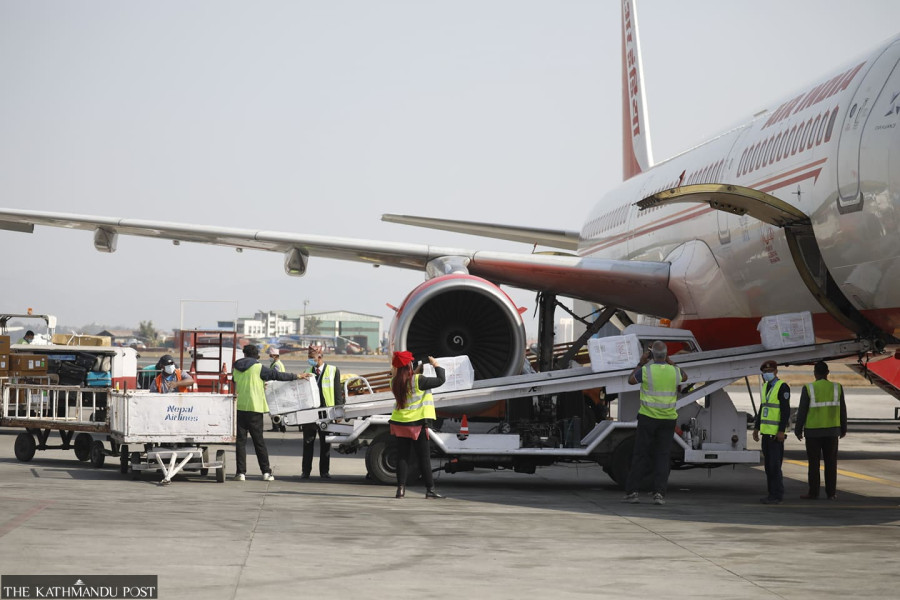Health
Authorities may no longer fast-track procurement of medical goods
They will now have to follow regular procurement process.
Prithvi Man Shrestha
The government agencies will now be required to make procurement of goods and services needed for combating Covid-19 by following the existing procurement laws, as the newly introduced ordinance on Covid-19 management has removed the provision of fast-track procurement.
The government introduced the ordinance on September 21 by removing the provision of a fast-track procurement process included in the previous ordinance introduced by the previous KP Sharma Oli-led government.
The previous ordinance turned void on September 15 after Parliament failed to endorse it within the constitutionally set deadline. As per the constitution, an ordinance should be endorsed within 60 days after it is presented in the parliament.
The government’s move to go for a regular procurement procedure comes amid decline in Covid-19 cases and increase in the number of vaccinated population.
“As the situation has normalised to a large extent, we decided to make procurement through a regular process,” said Dr Roshan Pokharel, secretary at the Ministry of Health and Population. “We can make procurement under the provision of exceptional circumstances in the Public Procurement Act if such a situation arises.”
As per section 41 of the Public Procurement Act 2007, the government entity can make direct procurement in exceptional circumstances.
The law defines special circumstance as the situation resulting from a natural calamity such as drought, no rainfall, deluge, earthquake, flood, landslide and fire, and an epidemic or unforeseen or unexpected circumstance. This term also covers the circumstance of war or internal conflict.
Dr Pokharel said the government has also made the necessary arrangements of medical facilities and goods in case the Covid-19 situation aggravates.
The previous Covid-19 Crisis Management Ordinance issued on May 20, had allowed the government agencies to procure medical goods, medicines, vaccines, and oxygen required to control Covid-19 with the manufacturers, suppliers, authorised distributors or international agencies without competitive bidding, irrespective of whatever provision was made in other procurement laws.
If these goods could not be available adequately in the country, authorised government officials or Nepali missions abroad could procure them directly.
As per the ordinance, the government authority could procure goods without preparing a procurement master plan or annual procurement plan. It could make advance payment without the necessary security guarantee.
Many government agencies had procured medical goods, vaccines, and medical equipment under the ordinance introduced by the erstwhile government. The Department of Health Services, however, failed to make procurement as required based on the provisions brought through the ordinance.
Officials at the department said that it just procured 1,000 oxygen cylinders and 50 ventilators after the Oli government brought the ordinance. The department largely relied on donated medical goods during the second wave of Covid-19 pandemic that hit the country in April.
“We cannot assess the effectiveness of the ordinance in procuring medical goods in time as the department failed to procure many goods,” said Semanta Dahal, a corporate lawyer with expertise in public procurement.
With the ordinance no longer in effect, public health experts have raised the question if the government has made adequate preparations for a possible third wave of Covid-19, as the government agencies should now procure goods by adopting longer procedures.
They said that even though Covid-19 cases have dropped sharply in recent days, the possibility of a new crisis could not be ruled out with a new variant of the coronavirus.
Dr Baburam Marasini, former director of Epidemiology and Disease Control Division, said the fast-track procurement process should have been scrapped only if they had managed adequate logistics, human resources, medical goods, and laboratories.
“ I am not confident about the government’s preparations considering its past failures,” Marasini said.
The government’s poor preparations were exposed when the second wave of pandemics hit the country bringing the country’s health system to a near collapse.
The government has claimed that it has arranged adequate medical facilities for any potential third wave.
But lawyer Dahal said that the government could have made the future supply of medical goods predictable had the government agencies signed framework agreements with major suppliers of medical goods to control Covid-19.
According to him, such an agreement can be signed, making the supplier responsible for the timely delivery of medical goods in the future.
“Framework agreements allow procurement authorities to issue a purchase order to procure goods to respond to imminent needs of a serious emergency,” Dahal said. “The government didn’t consider this option in the previous ordinance as well as the new one.”
The government has sought to procure medical facilities through normal processes amid decreasing Covid-19 cases in recent weeks and progress in the vaccination drive.
On May 11, the government reported a record-high 9317 cases in a single day. But, in recent weeks, the Covid-19 cases have sharply gone down and the Health Ministry on Wednesday reported as low as 892 Covid-19 cases.
Likewise, the country inoculated 7.21 million population with first jabs, 33.2 percent of the targeted population, while 6.23 million people have been fully vaccinated, 28.7 percent of the targeted population, according to the ministry.
But Dr Marasini said that vigilance should not be weakened particularly in the border areas, and the crowd should be avoided ahead of Dashain festival when people travel in masses.




 13.12°C Kathmandu
13.12°C Kathmandu















